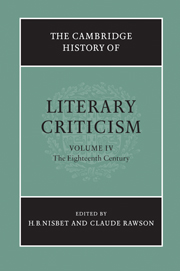Book contents
- Frontmatter
- INTRODUCTION: CRITICISM AND TRADITION
- GENRES
- LANGUAGE AND STYLE
- THEMES AND MOVEMENTS
- LITERATURE AND OTHER DISCIPLINES
- 26 Literature and philosophy
- 27 The psychology of literary creation and literary response
- 28 Taste and aesthetics
- 29 Literature and the other arts
- 30 Classical scholarship and literary criticism
- 31 Biblical scholarship and literary criticism
- 32 Science and literary criticism
- Bibliography
- Index
- References
30 - Classical scholarship and literary criticism
from LITERATURE AND OTHER DISCIPLINES
Published online by Cambridge University Press: 28 March 2008
- Frontmatter
- INTRODUCTION: CRITICISM AND TRADITION
- GENRES
- LANGUAGE AND STYLE
- THEMES AND MOVEMENTS
- LITERATURE AND OTHER DISCIPLINES
- 26 Literature and philosophy
- 27 The psychology of literary creation and literary response
- 28 Taste and aesthetics
- 29 Literature and the other arts
- 30 Classical scholarship and literary criticism
- 31 Biblical scholarship and literary criticism
- 32 Science and literary criticism
- Bibliography
- Index
- References
Summary
The hundred years of classical scholarship which elapsed between the careers of Richard Bentley (1662–1742.) and Friedrich August Wolf (1759–1824) may not have been as rich in individuals of passionate genius as the first centuries of Renaissance humanism (though, as we shall see, they too were enlivened by their own cranks and lunatics), nor as productive of enduring accomplishments as the well-organized national philological industries of the nineteenth century (though not a few of the editions and reference works published then are indispensable even today). But by working out the implications of some of the insights scattered throughout humanist scholarship, the classical philologists of the eighteenth century finally made it possible to overcome humanism; and by gathering and systematically organizing a vast amount of material and by putting on a firm basis for the first time the ancillary disciplines which were to study it, they laid a secure foundation for the scholars of the next century (who were all too often eager to deny how much there was to learn from them).
The most significant contribution of eighteenth-century classical scholarship to the history of literary criticism is to be found in the ‘internal’ development of a new set of literary critical methods and concepts within classical scholarship itself rather than in the ‘external’ relations between the academic study of Greek and Latin texts and contemporary discussions of literary-critical and theoretical issues. For the most part, in this period those ‘external’ relations were, at best, distant and vague. On the one hand, most eighteenth-century literary critics professed to share with their readers not only a cultivated familiarity with the classic texts but also a gentlemanly disdain for the dusty pedantry of the professors who studied them – Swift's and Pope's attacks on Bentley in such texts as The Battle of the Books and The Dunciad are two drastic but not unrepresentative examples – and it was only gradually, and especially in the last decades of the century, that some of the professors' insights and terms sifted into the critics' more popular discourse.
- Type
- Chapter
- Information
- The Cambridge History of Literary Criticism , pp. 742 - 757Publisher: Cambridge University PressPrint publication year: 1997
References
- 4
- Cited by

